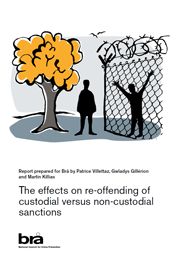- Start
- / Home
- / Publications

The effects on re-offending of custodial versus non-custodial sanctions
An updated systematic review of the state of knowledge
Systems of criminal sanctions around the world comprise both custodia and non-custodial sanctions. But what impact do custodial versus non-custodial sanctions have on the re-offending of those convicted of offences?
Does a custodial sentence produce more or less re-offendin than a non-custodial sanction? What does the research tell us? Systematic reviews are one means of helping people to pick their way through the jungle of research findings. Systematic reviews combine a number of studies that are considered to satisfy a list of empirica criteria for measuring effects as reliably as possible. The results of these studies are then used to calculate and produce an overall picture of the effects associated with a certain phenomenon. In this way, systematic reviews systematically produce a more reliable overview based on the best knowledge available.
The Swedish National Council for Crime Prevention (Brå) has therefore initiated the publication of a series of systematic reviews, in the context of which distinguished researchers have been commissioned to perform the studies on our behalf. In this study, the authors have carried out a systematic review, including a meta-analysis, of 24 studies from different part of the world, on the effects of criminal sanctions on re-offending.
Dr. Patrice Villettaz is Lecturer at the School of Criminal Justice, University of Lausanne, Switzerland.
Dr. Gwladys Gilliéron is Senior Lecturer at the Law Faculty, Universit of Zürich, Switzerland.
Professor Martin Killias is professor of criminology and criminal law at the University of St. Gallen Law School, Switzerland.
Report prepared for Brå by Patrice Villettaz, Gwladys Gillérion and Martin Killias
Published 2014
urn:nbn:se:bra-571

